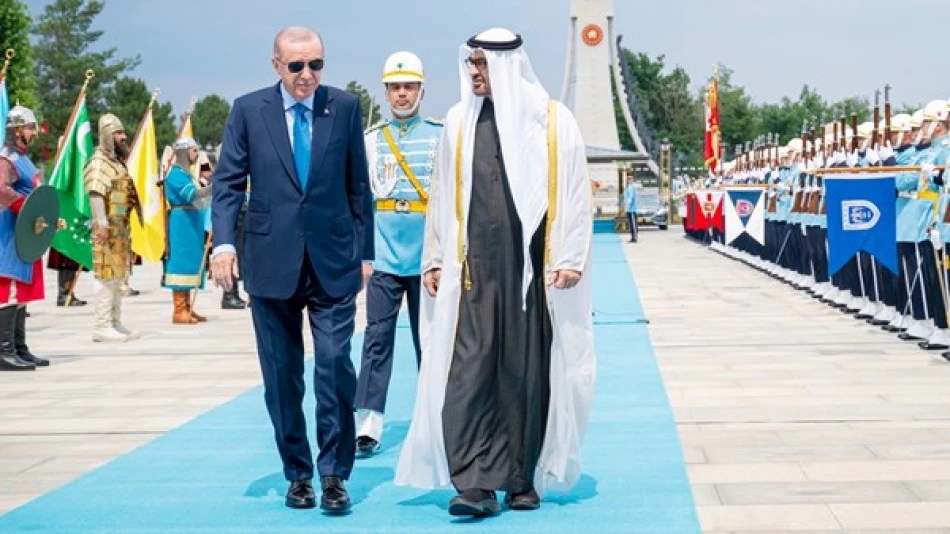
UAE Leader Emphasizes Commitment to Strengthening Peace and Stability through Cooperation with Turkey
UAE and Turkey Signal Deeper Economic Partnership as Regional Powers Seek Stability
UAE President Sheikh Mohammed bin Zayed Al Nahyan and Turkish President Recep Tayyip Erdogan have emphasized their commitment to expanding bilateral cooperation, particularly in development and economic sectors, during high-level talks in Ankara. The meeting signals a continued thaw in relations between two regional powers that were previously at odds over Middle Eastern conflicts, now positioning themselves as partners for regional stability and economic growth.
From Rivalry to Partnership: A Strategic Shift
The UAE leader's visit to Ankara represents a significant evolution in bilateral relations that were strained for nearly a decade. The two nations found themselves on opposite sides of regional conflicts, from Syria to Libya, with Turkey supporting Islamist movements while the UAE backed opposing factions. This diplomatic reset began in earnest in 2021 and has since translated into tangible economic cooperation.
Sheikh Mohammed bin Zayed emphasized that the UAE is "keen to cooperate with Turkey to consolidate peace, security, and stability in the region," marking a departure from their previous proxy confrontations across the Middle East.
Economic Cooperation Takes Center Stage
Trade and Investment Momentum
The focus on comprehensive economic partnership reflects both countries' pragmatic approach to regional relations. Turkey, grappling with economic challenges including inflation and currency volatility, stands to benefit significantly from UAE investment and financial expertise. The Emirates, meanwhile, sees Turkey as a strategic gateway to European markets and a manufacturing hub.
This economic pivot mirrors similar strategies employed by Gulf states with other regional powers. The UAE's approach to Turkey echoes its successful economic diplomacy with Egypt and its growing ties with Israel following the Abraham Accords.
Development Sector Opportunities
The emphasis on development cooperation suggests potential collaboration in infrastructure projects, renewable energy, and technology transfer. Turkey's construction expertise combined with UAE capital could create synergies similar to those seen in the UAE's partnerships with Asian economies.
Regional Stability as Economic Imperative
The leaders' focus on regional peace and security reflects a broader understanding that economic prosperity requires political stability. Both nations have learned costly lessons from prolonged regional conflicts that drained resources and created uncertainty for investors.
This pragmatic approach aligns with broader regional trends, where economic interests increasingly outweigh ideological differences. Saudi Arabia's rapprochement with Iran and the UAE's normalization with Israel demonstrate how Middle Eastern powers are prioritizing economic development over traditional rivalries.
Market Implications and Future Outlook
For investors and businesses, the UAE-Turkey partnership signals new opportunities in sectors ranging from logistics and tourism to technology and finance. Turkey's strategic location bridging Europe and Asia, combined with the UAE's position as a global business hub, creates potential for enhanced trade corridors and investment flows.
The strengthening ties also suggest greater regional stability, which could benefit energy markets and reduce geopolitical risk premiums. As both countries work to diversify their economies away from traditional sectors, their cooperation could accelerate innovation and development across the region.
This partnership represents more than bilateral cooperation—it signals a new model for Middle Eastern diplomacy where economic pragmatism takes precedence over political differences, potentially inspiring similar reconciliations across the region.
Most Viewed News

 Layla Al Mansoori
Layla Al Mansoori






